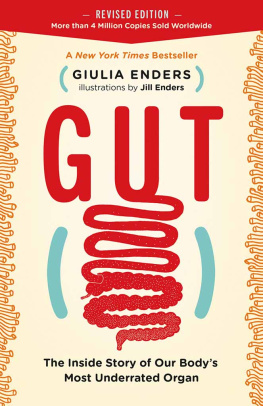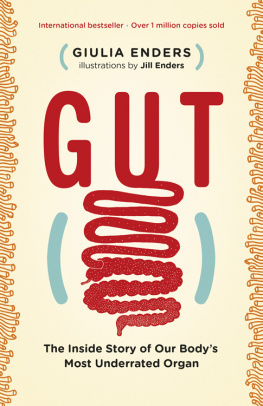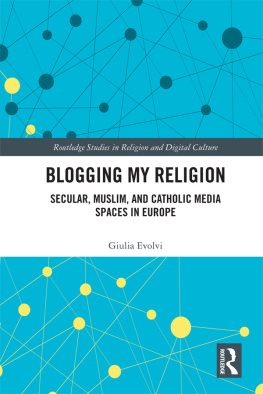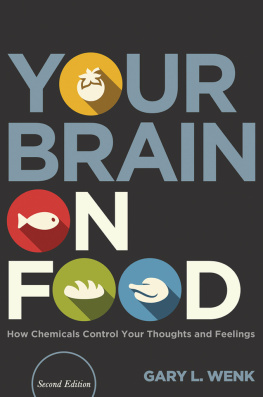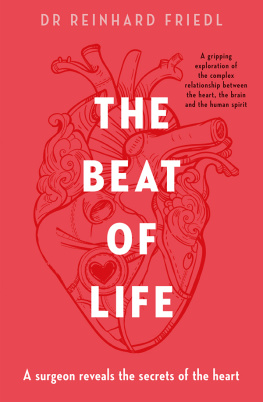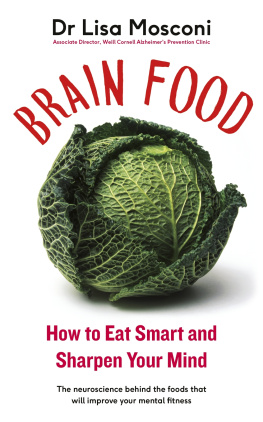

For all single parents who put as much energy and love into
bringing up their children as our mother did for my sister and me.
And for Hedi.
Copyright 2015, 2018 by Giulia Enders
Illustrations copyright 2015, 2018 by Jill Enders
Translation copyright 2015, 2018 by David Shaw
Originally published in Germany as Darm mit Charme by Ullstein 2014
First published in English by Scribe 2015
All rights reserved. No part of this book may be reproduced, stored in a retrieval system or transmitted, in any form or by any means, without the prior written consent of the publisher or a license from The Canadian
Copyright Licensing Agency (Access Copyright). For a copyright license, visit
www.accesscopyright.ca or call toll free to 1-800-893-5777.
Greystone Books Ltd.
greystonebooks.com
Cataloguing data available from Library and Archives Canada
ISBN 978-1-77164-376-4 pbk.
ISBN 978-1-77164-378-8 epub
Editing by Jane Billinghurst
Cover and interior illustrations by Jill Enders
Cover and interior design by Peter Cocking and Nayeli Jimenez
We gratefully acknowledge the support of the Canada Council for the Arts, the British Columbia Arts Council, the Province of British Columbia through the Book Publishing Tax Credit, and the Government of Canada for our publishing activities.

The advice provided in this book has been carefully considered and checked by the author and publisher. It should not, however, be regarded as a substitute for competent medical advice. Therefore, all information in this book is provided without any warranty or guarantee on the part of the publisher or the author. Neither the author nor the publisher or their representatives shall bear any
Contents

Preface

I WAS BORN BY cesarean section and could not be breast-fed. That makes me a perfect poster child for the intractability of the gastrointestinal tract in the twenty-first century. If I had known more about the gut back then, I could have placed bets on what illnesses I would contract later in life. At first I was lactose intolerant. I never thought about why I was suddenly able to drink milk again at the age of five. At some point I got fat, then thin again. Then, for a long time, I was fineuntil I got the sore.
When I was seventeen, I developed a small sore on my right leg, for no apparent reason. It stubbornly refused to heal, and after a month I went to see my doctor. She didnt really know what it was and prescribed me some cream. Three weeks later, my entire leg was covered in sores. Soon they spread to my other leg, my arms, and my back. Sometimes they appeared on my face. Luckily, it was winter at the time, and everyone thought I had cold sores and a graze on my forehead.
No doctor was able to help megiving me vague diagnoses of some kind of nervous eczema. They asked me about stress and psychological problems. Cortisone helped a little, but as soon as I stopped using it, the sores just came back. For a whole year, in summer and in winter, I wore tights to stop my sores from weeping through my pants. Then I pulled myself together and started doing some research of my own. By chance, I came across a report about a very similar skin condition. A man had contracted it after taking antibiotics, and I, too, had had to take a course of antibiotics just a couple of weeks before my first sore appeared. It occurred to me that although the sores were on my skin, their appearance might be related to what was going on inside me. Perhaps the course of antibiotics was key? Had they somehow affected my gut?
From that moment on, I ceased to treat my skin like the skin of a person with a dermatological problem and began to see it as the skin of a person with an intestinal condition, though just what that condition might be, I did not know. I decided to cover all the bases. I stopped eating dairy products, cut out gluten almost entirely, swallowed various bacterial cultures, and generally improved my diet. I also carried out some pretty crazy experiments on myself. If I had already been studying medicine at that time, I wouldnt have dared do half of them. Once, I overdosed on zinc for several weeks, causing me to have an extremely heightened sense of smell for the next few months.
With a few tricks, I finally managed to get my condition under control. This success gave me a lift, and I experienced with my own body that knowledge is power. Thats when I started studying medicine.
In my first semester as a student, I was at a party where I ended up sitting next to a guy who had the smelliest breath I have ever smelled. It wasnt a typical bad-breath smellnot the scratchy hydrogen-breath odors of stressed-out middle-aged gentlemen nor the sugary, fetid funk from the mouth of an elderly aunt with too sweet a tooth. After a while, I moved away and sat somewhere else. The next day, he was dead. He had killed himself. I couldnt get him out of my mind. Was there a way his gut might have contributed to this? Just like my skin condition, which at first appeared unrelated? Now I had some experience in medical school, I wondered if it could have been a diseased gut creating that smell, and if so, could a diseased gut also have affected that mans psychological state?
A week later, I decided to share my suspicion with a good friend. And a few months after that, the same friend contracted a bad case of gastroenteritis, which left her feeling very poorly. The next time we met, she told me she thought there might be something in my theory, as her illness had made her feel worse than she ever had felt before, psychologically as well as physically. Her comments inspired me to start looking more closely at this subject matter.
Soon, I discovered there was an entire branch of medical research investigating the links between the gut and the brain. Its a rapidly growing field of study. Ten or so years ago, there were hardly any published studies on the subject; now there are several hundred academic articles covering the field. The influence of the gut on our health and well-being is one of the new lines of research in modern medicine. The renowned American biochemist Rob Knight told the journal Nature that the field offered at least as much promise as stem cell research. I had stumbled upon a subject I found more and more fascinating.
As I continued my medical degree, I got more insight into how my cesarean birth and lack of breast-feeding might have influenced my health later in life. I also realized how neglected, even looked down upon, this area still is in the medical world. This is all the more surprising when you consider what an extraordinary organ the gut is. It accounts for two-thirds of our immune system, extracts energy from sandwiches and vegetarian sausages, and produces more than twenty unique hormones. Most doctors learn very little about this in their training. When I visited the Microbiome and Host Health symposium in Lisbon in May 2013, the number of participants was modest. About half came from institutions with the financial wherewithal to allow them to be among the pioneers, including Harvard, Yale, Oxford, and the European Molecular Biology Laboratory (EMBL) at Heidelberg University.

